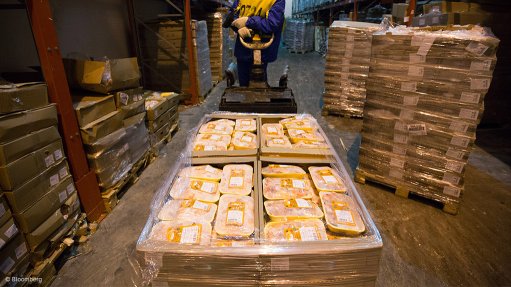
JSE-listed Astral Foods stated on Monday that the decrease in headline earnings from R387-million for the previous year's first six months to R299-million for the period under review was attributable to lower profits from the poultry division following mainly drought-related increases in feed costs.
“High maize and feed prices will continue until at least rainfall patterns normalise, with some midsized industry producers already showing signs of financial distress,” the integrated poultry producer said in its unaudited interim results for the period.
Positively, a weakening of the El Niño weather event could favour better planting conditions for maize in the coming season as normal rainfall was predicted.
However, it was expected that the demand for poultry would continue to be subdued, owing to limited consumer discretionary spend and weaker seasonal poultry consumption patterns.
On the back of the weakened demand, the high level of poultry imports and the potential African Growth and Opportunity Act (Agoa) impact of US poultry would see South African broiler production cutbacks, owing to an imbalance in supply and demand.
Poultry imports remained high during the six months under review, with the first shipment of US poultry under the Agoa quota landing in March. An average 7.7-million birds a week (total poultry product imports) were recorded for the six months ending March, Astral added.
Astral also emphasised that the weak rand would continue to negatively impact input costs on imports of poultry genetics, maize and soya. Although, Astral highlighted that world raw material stocks were exceptionally healthy.
Astral reported a marginal revenue increase for the six months ending March of 1.2% to R5.8-billion, noting that this was the result of the increase in the value of external feed sales.
Revenue for Astral’s poultry division was down by 1.5% for the period under review, which was impacted by lower sales volumes; weaker demand and the continued high level of European Union poultry imports led to a build-up in poultry stock levels, with subsequent broiler production cutbacks.
In terms of the feed division, revenue increased by 16.8%. This growth was as a result of a 16.2% increase in selling prices to recover the inflation of raw material costs on the back of South Africa’s severe drought. Sales volumes increased marginally by 0.6% driven by a small increase in external sales.
The Africa division reported revenue growth of 0.8%, driven largely by higher feed selling prices in Zambia.
On the other hand, the group's operating profit decreased by 22.1 % to R429-million.
The poultry division's contribution of R194-million was down on the previous year's operating profit of R351-million.
However, Astral’s feed division recovered the increased maize costs in its selling prices for feed, with its profits of R233-milliotranslating to a 25.6% increase on the comparative period.
The company said its new Standerton feed mill continued with its significant contribution to the profitability of the feed division.
In terms of Astral’s Africa division, R1-million profit was contributed during the six months under review, down on the previous year's R13-million. Trading conditions in both Zambia and Mozambique were negatively affected by the devaluation of the respective local currencies, which had a negative impact on those economies.
Astral said the deteriorating economic situation in Mozambique was a concern as it impacted on the value of Astral's business operations in the country, while ongoing power outages in Zambia had a significant impact on operating costs with a high diesel requirement to power standby generators.
Astral declared an interim dividend of 390c a share for the six months ended March 31.